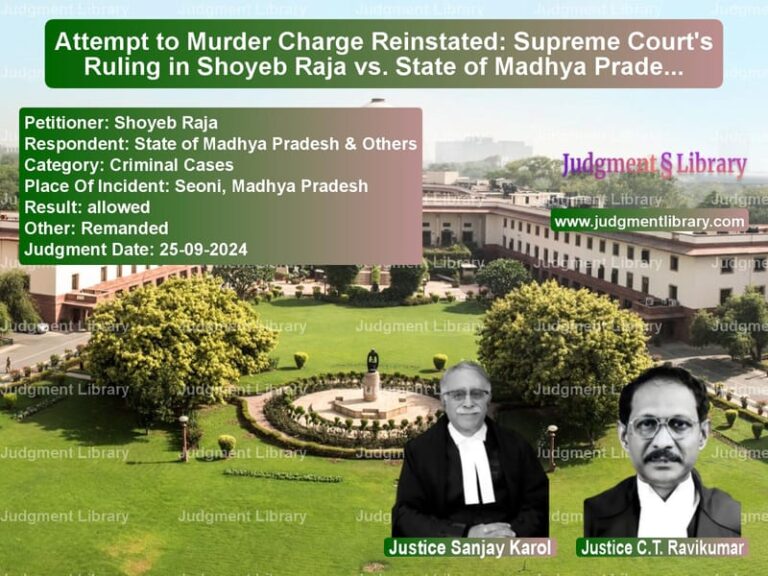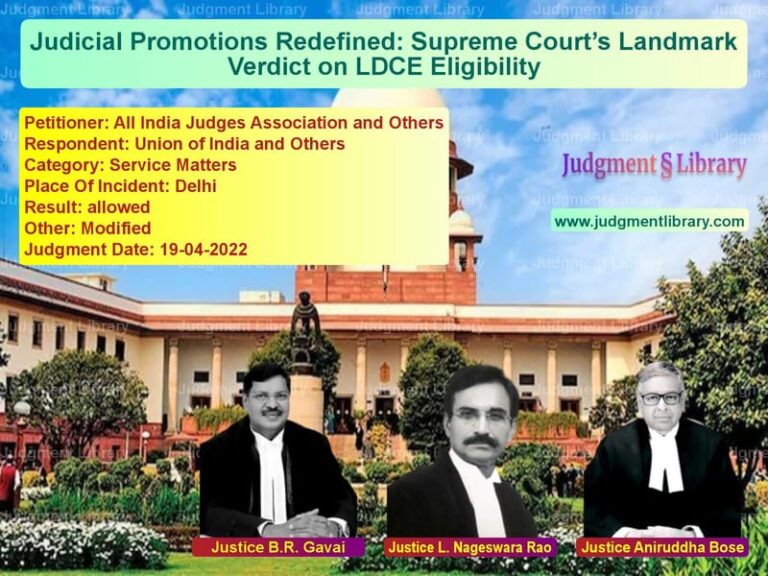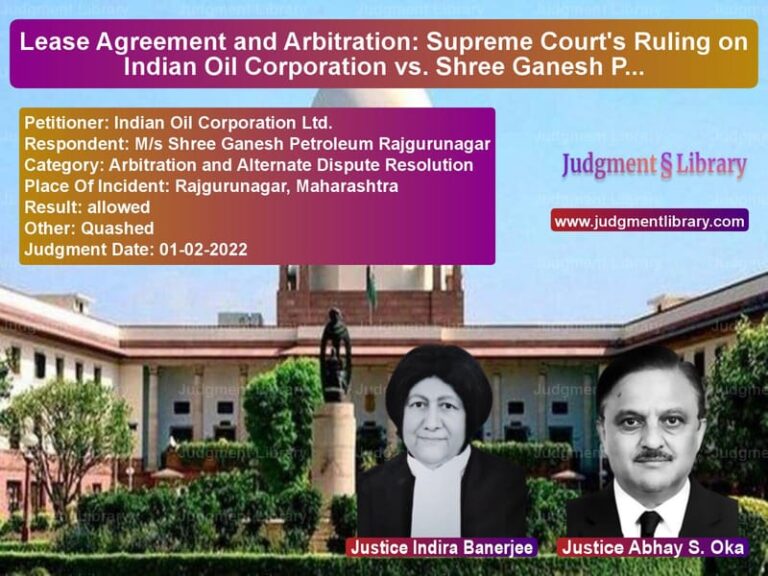Quashing of Criminal Proceedings: Supreme Court Reinstates Cheating Case in Dilbag Rai vs. State of Haryana
The case of Dilbag Rai vs. State of Haryana & Ors. is a significant ruling addressing the quashing of criminal proceedings under Section 482 of the Criminal Procedure Code (CrPC). The Supreme Court was called upon to determine whether the Punjab and Haryana High Court was justified in quashing a case involving allegations of cheating, fraud, and misrepresentation.
The dispute arose when the complainant alleged that the accused had fraudulently induced him to enter into a property transaction and accept an advance payment despite lacking ownership of the said property. The Supreme Court’s ruling in this case clarifies the limits of the High Court’s power under Section 482 CrPC and reinforces the principle that cases involving allegations of fraud should be decided at trial rather than dismissed at a preliminary stage.
Background of the Case
The dispute originated when the appellant, Dilbag Rai, accused the respondent of fraudulent misrepresentation in a real estate transaction. The key developments in the case were:
- On December 1, 2011, the accused entered into an agreement to sell an 8-marla property in Shahabad, Kurukshetra.
- The appellant made an advance payment of Rs. 10 lakhs, as per the agreement.
- The agreement stated that possession was handed over to the appellant, but in reality, it was not.
- When the accused failed to complete the sale, the appellant approached the Superintendent of Police in Kurukshetra on January 30, 2014, seeking action against the accused.
- The matter was referred to the Economic Crime Cell, which concluded that the dispute was civil in nature.
- Subsequently, the appellant filed an application under Section 156(3) of the CrPC, leading to the registration of an FIR on June 21, 2014.
- The accused approached the Punjab and Haryana High Court under Section 482 CrPC, seeking quashing of the FIR.
- The High Court, in its judgment dated February 11, 2016, quashed the criminal proceedings, reasoning that the matter was a civil dispute.
- The complainant, dissatisfied with the quashing of the case, appealed to the Supreme Court.
Legal Issues Considered
The Supreme Court examined the following key legal questions:
- Can allegations of fraud, misrepresentation, and cheating be treated as purely civil disputes?
- Did the High Court err in quashing the FIR under Section 482 CrPC?
- At what stage can a High Court exercise its power to quash criminal proceedings?
Arguments by the Appellant
The appellant, Dilbag Rai, contended that the High Court had wrongly quashed the criminal proceedings. His key arguments were:
- “The accused induced me to part with Rs. 10 lakhs despite lacking ownership of the property, which constitutes cheating under Section 420 IPC.”
- “The Economic Crime Cell’s conclusion that the dispute was civil in nature was incorrect, as there was clear fraudulent intent.”
- “The accused’s actions were not a mere breach of contract but an intentional deception to obtain money unlawfully.”
- “The High Court overstepped its jurisdiction under Section 482 CrPC by evaluating the merits of the case instead of allowing a trial.”
Arguments by the Respondents
The respondents argued that the allegations did not constitute a criminal offense. Their key submissions were:
- “The dispute pertains to a real estate transaction and should be resolved through civil litigation.”
- “There was no dishonest intention at the time of entering into the agreement, which is necessary for proving cheating under Section 420 IPC.”
- “The High Court rightly exercised its power under Section 482 CrPC to prevent abuse of legal proceedings.”
Supreme Court’s Observations and Judgment
The Supreme Court, comprising D.Y. Chandrachud and M.R. Shah, overturned the High Court’s decision and reinstated the criminal proceedings. The Court held:
“The High Court was not justified in taking recourse to its power under Section 482 CrPC to quash the proceedings at this stage.”
The Supreme Court provided the following reasons:
- At the stage of quashing an FIR, the High Court should not conduct a detailed examination of the facts and evidence.
- The allegations made by the appellant indicated elements of cheating and fraudulent misrepresentation.
- Even though there was a civil remedy available, that did not preclude criminal prosecution if the elements of an offense were present.
- The accused had entered into an agreement for a property she did not own, which could not be dismissed as a mere contractual dispute.
The Court further emphasized:
“Whether these allegations are true or otherwise is a matter of trial.”
Implications of the Judgment
The Supreme Court’s ruling has important implications:
- It reinforces that fraudulent misrepresentation can attract both civil and criminal liability.
- It limits the High Court’s power to quash criminal cases under Section 482 CrPC, ensuring that cases involving allegations of fraud proceed to trial.
- It protects complainants from the premature dismissal of genuine criminal complaints under the guise of civil disputes.
Final Decision
The Supreme Court set aside the High Court’s order and reinstated the criminal proceedings. The Court clarified that its ruling did not determine the merits of the case but ensured that the trial should proceed:
“For these reasons, we allow the appeal and set aside the impugned order of the High Court. However, we clarify that we have expressed no opinion on the merits of the accusation, which remains a matter for trial.”
This ruling sets a clear precedent that allegations of fraud should not be dismissed at a preliminary stage but should be examined thoroughly in a trial to determine criminal liability.
Petitioner Name: Dilbag Rai.Respondent Name: State of Haryana & Ors..Judgment By: Justice Dhananjaya Y. Chandrachud, Justice M.R. Shah.Place Of Incident: Kurukshetra, Haryana.Judgment Date: 03-12-2018.
Don’t miss out on the full details! Download the complete judgment in PDF format below and gain valuable insights instantly!
Download Judgment: Dilbag Rai vs State of Haryana & O Supreme Court of India Judgment Dated 03-12-2018.pdf
Direct Downlaod Judgment: Direct downlaod this Judgment
See all petitions in Fraud and Forgery
See all petitions in Extortion and Blackmail
See all petitions in Judgment by Dhananjaya Y Chandrachud
See all petitions in Judgment by Mukeshkumar Rasikbhai Shah
See all petitions in allowed
See all petitions in supreme court of India judgments December 2018
See all petitions in 2018 judgments
See all posts in Criminal Cases Category
See all allowed petitions in Criminal Cases Category
See all Dismissed petitions in Criminal Cases Category
See all partially allowed petitions in Criminal Cases Category







